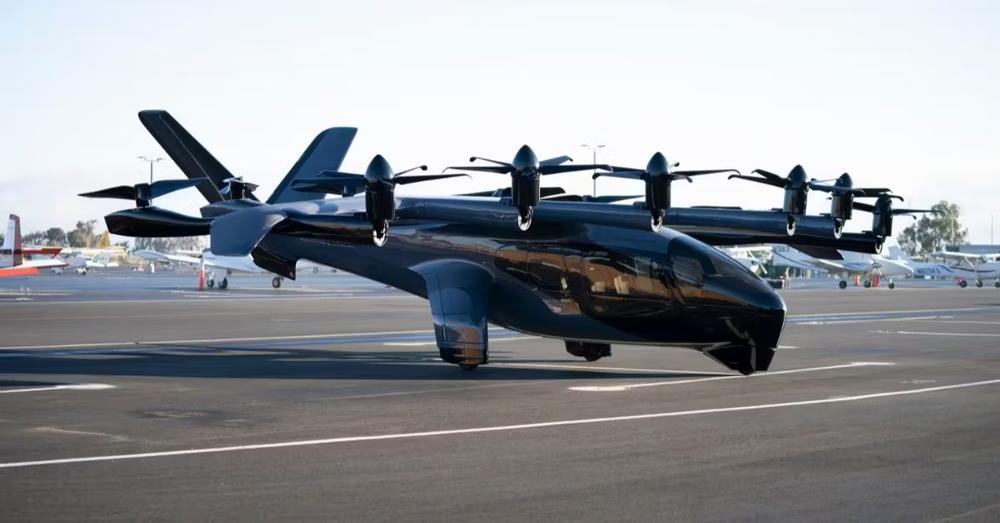
Caption
Electric vertical take-off and landing vehicles (eVTOLs) soon will be plying the skies above Georgia.
Credit: Photo Courtesy of Archer Aviation

Electric vertical take-off and landing vehicles (eVTOLs) soon will be plying the skies above Georgia.
ATLANTA – Flying cars might seem like something out of the distant future, zipping back and forth like in The Jetsons, the Hanna-Barbera Space Age animated TV series of the 1960s.
But Advanced Air Mobility (AAM), as the technology is known, is about to land at a general aviation airport near you.
At least 20 states — including Georgia — are starting to explore AAM technology, an investment of more than $8 billion today that is expected to grow to $45 billion by 2030, Clement Solomon, director of the Georgia Department of Transportation’s Intermodal Division, told members of the State Transportation Board last month.
The Federal Aviation Administration is expected to certify the first electric vertical take-off and landing vehicles (eVTOLs) late this year or early in 2025, Solomon said.
“This thing’s futuristic,” Georgia Commissioner of Transportation Russell McMurry added. “But there’s been activity already in Georgia with these types of AAMs.”
California-based Archer Aviation is building a 350,000-square-foot manufacturing plant adjacent to the Covington Municipal Airport in Newton County to produce up to 650 eVTOLs each year.
In Augusta, private air charter operator Bravo Air is working with Japan’s SkyDrive to begin flying passengers on short trips aboard eVTOLs the Japanese company has begun building through a joint venture with Suzuki Motor Corp.
Solomon said AAM technology focuses on transporting passengers and cargo on short trips at low altitudes. Flying at altitudes of 1,500 feet to 4,500 feet, eVTOLs are capable of transporting four to six passengers up to 250 miles.
“The concept right now is Air Uber,” he said.
Solomon said the freight potential of AAM technology is in carrying “low-volume, high-value” cargo, such as computer chips, medical equipment, or human organs needed for transplant.
Because they’re electric, eVTOLs are both quieter and more environmentally friendly than traditional combustion engine aircraft, Solomon said.
“In Columbus, our airport creates a lot of noise,” added Cathy Williams, a member of the State Transportation Board representing Georgia’s 2nd Congressional District. “This would be a nice addition that wouldn’t exacerbate that part of the problem.”
The Georgia DOT formed a working group last year to assess the potential for AAM technology in Georgia. The group included representatives of airports, municipal planning organizations, and the academic and business communities.
Solomon said the study found that nearly all of Georgia’s airports are compatible for eVTOLs and have the capacity to support AAM.
A network of eVTOL chargers needs to be built, at a cost of $500,000 to $750,000 each. Currently, the only chargers for the vehicles in Georgia are in Augusta and Valdosta, he said.
Solomon said the goals of the study were to set the stage for rolling out AAM technology in the next three to five years, with eVTOLs expected to begin commercial operations between 2026 and 2030.
Archer Aviation’s plans could come into fruition even earlier. Last month, the company announced an agreement with the Abu Dhabi Investment Office to begin air taxi operations using Archer’s four-passenger Midnight eVTOL model in the United Arab Emirates as soon as next year.
“This substantial agreement with Abu Dhabi is a pivotal moment for Archer’s commercialization efforts across the Emirates,” said Adam Goldstein, Archer’s founder and CEO. “The agreement underscores Abu Dhabi’s strong commitment to Archer and conviction to become a global hub for urban air mobility.”
Closer to home, SkyDrive’s agreement with Bravo Air calls for developing infrastructure to support a network of eVTOL air-taxi services to include Augusta Regional Airport. Bravo Air is buying five of the three-passenger eVTOL models SkyDrive is building in Japan to compete for certification in time to begin operations during the Osaka World Expo next year.
“Bravo Air is thrilled to be working with SkyDrive on revolutionizing advanced air mobility in the U.S.,” said Dann Standard, Bravo’s vice president of operations. “We are excited to be park of a collaborative effort to bring more environmentally conscious air travel options to the Augusta area and beyond.”
This story comes to GPB through a reporting partnership with Capitol Beat.